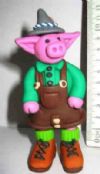|
ESL Forum:
Techniques and methods
in Language Teaching
Games, activities
and teaching ideas
Grammar and
Linguistics
Teaching material
Concerning
worksheets
Concerning
powerpoints
Concerning online
exercises
Make suggestions,
report errors
Ask for help
Message board
|
ESL forum >
Grammar and Linguistics > Superlatives and Comparatives
Superlatives and Comparatives
|

mariaelaine

|
Superlatives and Comparatives
|
|
Hi Everyone,
Could anyone be so kind as to explain the difference between older/oldest and elder/eldest? Thanks so much in advance. |
3 Nov 2014
|
|
|
|

s.lefevre

|
|
Have a look here http://dictionary.cambridge.org/pt/gramatica/gramatica-britanica/elder-eldest-or-older-oldest |
3 Nov 2014
|
|
|

isa2

|
attributive use for family members only: e.g. my elder brother/ her eldest aunt
BUT: my brother is 5 years older (predicative use)
for other cases: use OLDER/ OLDEST: e.g. He is my oldest friend.
|
3 Nov 2014
|
|
|

redcamarocruiser

|
|
My oldest friend means the friend I have known the longest. My eldest friend means the friend who is the most aged or older than all my other friends.
That said, many people no longer make the distinction between oldest and eldest, using oldest for everything. Then we have to rely on context to know whether they are talking about their first friend or their most aged friend.
|
3 Nov 2014
|
|
|

isa2

|
Sorry, redcamarocruiser, but it �s only one person �s opinion on a forum that you refer to.
What you say may well be common colloquial usage, but in teaching I think we should rely on grammar rules first before relying on current variations, don �t you think so?
(Sorry for being a GRAMMASAURUS  ) )
|
3 Nov 2014
|
|
|

yanogator

|
|
Much of what is taught as grammar "rules" is just what the common usage was at the time they were written down. English is a constantly changing language, and it is important for the students to be able to communicate effectively. I �m sure that I haven �t heard the word "eldest" used in over 30 years.
Bruce |
3 Nov 2014
|
|
|

Manuhk

|
I agree with Bruce, we �ve been splitting infinitives since Star Trek after all 
|
3 Nov 2014
|
|
|
|
|

douglas

|
|
I �m with Bruce on this one. For example, I don �t generally teach "whom" either, but I do warn them that some teachers are still "in the dark ages" about it.
What thinketh thee, Milord/Milady  |
4 Nov 2014
|
|
|

FrauSue

|
|
I would use elder/eldest for family members. To me, it doesn �t sound dated (formal, yes, but not dated). In all other situations, use older/oldest.
Elder as a noun can mean "an older, wiser person" (e.g. a church elder) or a kind of tree and the wood from it (e.g. the elder wand in Harry Potter). |
4 Nov 2014
|
|
|

isa2

|
We should not negect that language is not only spoken but also written (literature /business/ science etc.)
So we should not only bow to what is common usage at the moment but teach a language according to its set of rules. It �s not for the teacher to decide what is right or wrong: let �s grammarians do their jobs. SS will more than willingly pick up non-standard forms in due course, I am sure.
(The old fossil  ) )
|
4 Nov 2014
|
|
1
2
Next >
|